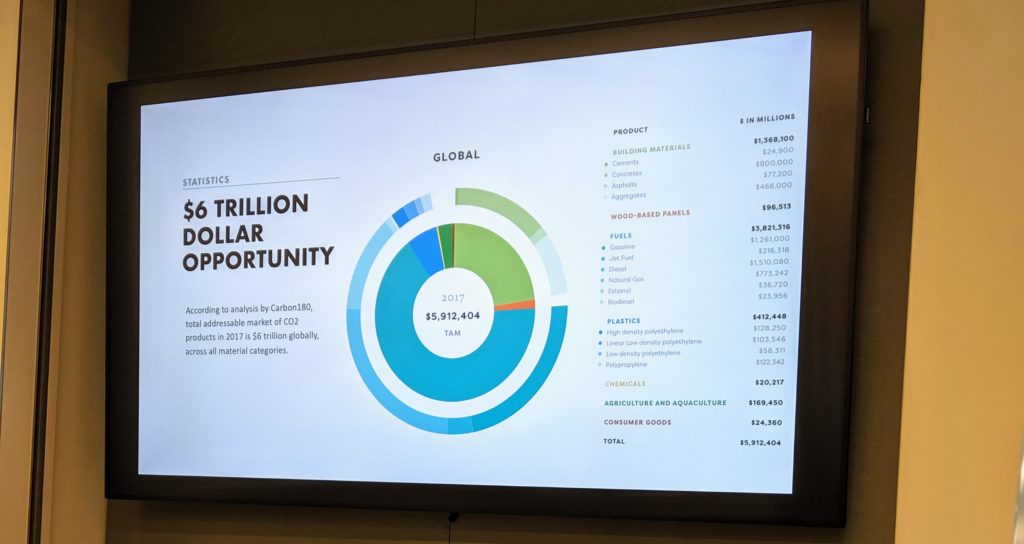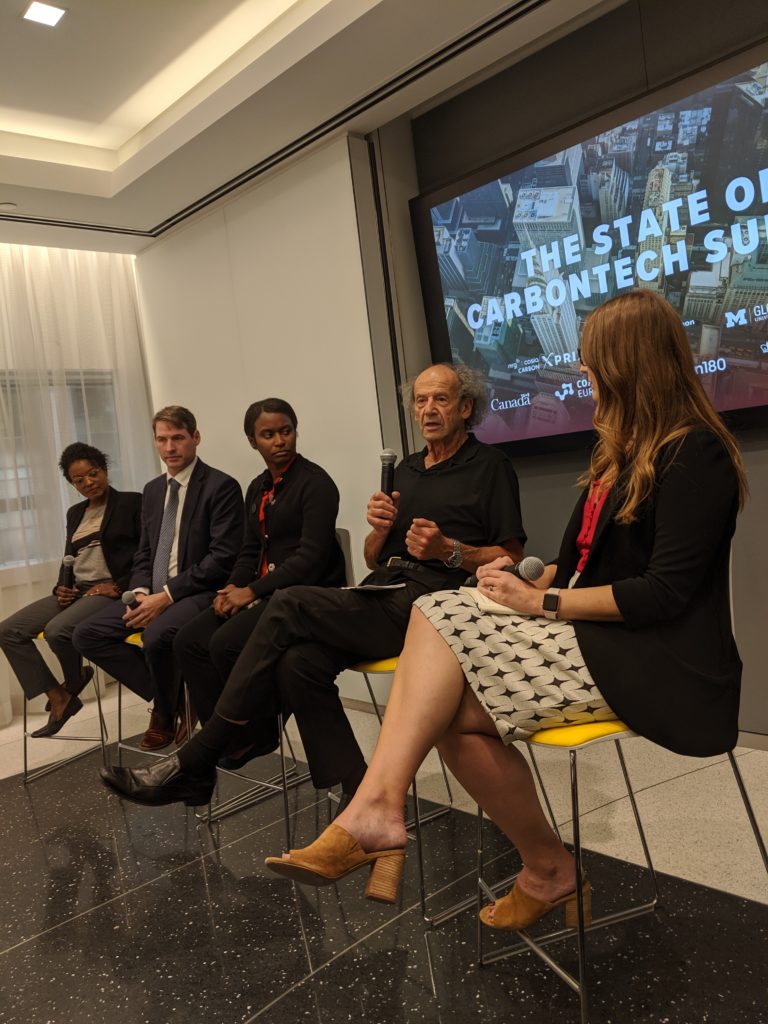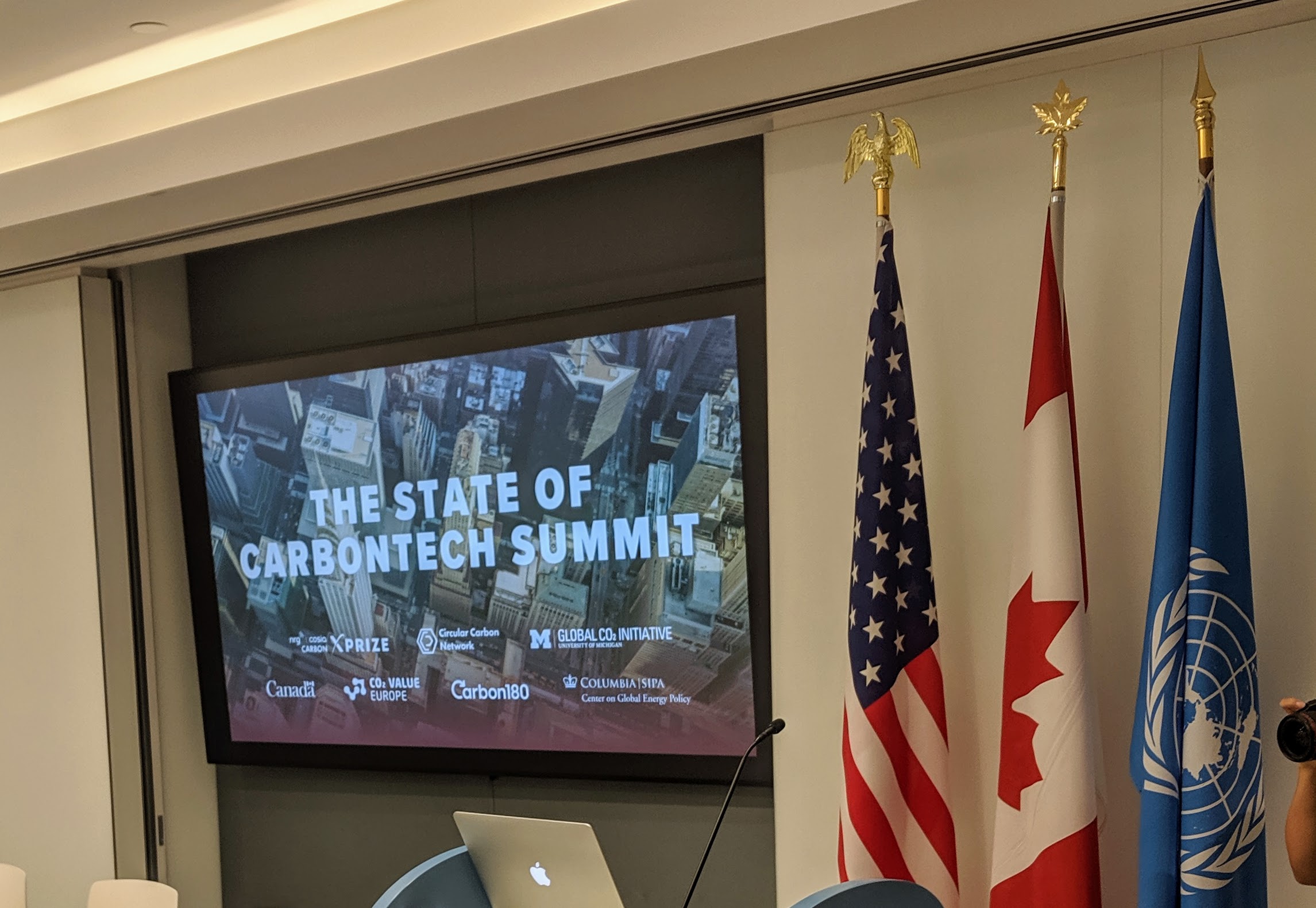On Tuesday, September 24, 2019, we convened the “State of Carbontech” summit along with our gracious hosts at the Canadian Consulate of New York and our partners CO2 Value Europe, Carbon 180, Columbia SIPA Center on Global Energy Policy, and the University of Michigan Global CO2 Initiative.

We looked at the accelerating emergence of the sector from the capital, entrepreneurial, commercial, and policy perspective and were fortunate to have panelists from a variety of backgrounds and perspectives sharing their insights.
Below we summarize highlights and key takeaways from our entrepreneur fireside chat. You can see the summary from our investor dialogue here.
Comments lightly edited for length and clarity:
Entrepreneur Panel

Left to Right:
Lisa Dyson – CEO of Kiverdi and Air Protein (CO2 conversion to feed and biodegradable plastic substitutes)
Brett Henkel – Co-Founder of Svante (fka Inventys – industrial CO2 capture)
Etosha Cave – Founder of Opus 12 (CO2 conversion to fuels and chemicals)
Peter Eisenberger – Co-Founder of Global Thermostat (direct air capture)
Nikki Batchelor – XPRIZE and The Circular Carbon Network
Tell us about your company
“Global Thermostat is a direct air capture (DAC) technology company that efficiently captures CO2 for use by commercial customers. We’ve been around for about 10 years. The first few of them seemed crazy but now we’re starting to feel like a salmon finally flooded with downstream waters” – Peter
“Opus 12 breaks down CO2 with metals and electricity to make chemicals and fuels” – Etosha
“Svante captures industrial CO2 emissions. We’re focused on big emitters like concrete, steel, and fertilizer production. We’re an enabler of CO2 utilization and conversion.” – Brett
“Kiverdi came out of Nasa research focused on using microbes to capture and convert CO2 in space vehicles. We’re converting CO2 into feed and plastics into biodegradable materials” – Lisa
What are some of your fundraising challenges?
“Blending the concept of saving the planet and making a return can be confusing for investors. I make the case that climate change unabated will hurt all returns but since we have the technology and solutions let’s just decide to do it” – Peter
“No Silicon Valley investors would fund this so we sought out philanthropic capital initially and now a combo of public and private capital” – Etosha
“We’ve raised $100M over 12 years because we had a business model but policy certainty is important for the business case. There are also geographical challenges where you have a policy like 45Q in the US but a different rule elsewhere.” – Brett
“We were initially funded by the DOE and California. After that, we got funding from Canada and Europe. We had an early shift towards focusing on the business value for corporate customers. We listened to their needs and started building solutions leveraging the flexibility of our platform and microbes.” – Lisa
Tell us about a success story
“When we showed we could help companies profit, fundraising and commercialization became much easier” – Lisa
“We have a partnership with Lafarge Holcim. Corporations are generally changing. They are more inclined to work together across industries which is required in this sector. When we put together a consortium of companies we are able to get more risk-averse companies to move forward together.” – Brett
“We’ve got a contract with the Air Force to make jet fuel in containers. We were able to attract capital from DCVC and family offices to match public investment in the contract” – Etosha
“Patient family office capital was a real hero for Global Thermostat” – Peter
What problem in the sector do you wish was addressed?
“Massive public awareness and pressure to force the issue” – Brett
“More sources of non-dilutive early capital for for R&D” – Etosha
“A ‘Carbon Solutions Innovation Center’ where startups can fit together and show an end-to-end solution. In fact, I met someone during the Carbon XPRIZE and we combined forces” – Lisa
“Policy choices need to be made and clear around mitigation, renewables, or carbon removal. We need to focus like the Manhattan and Apollo projects in this country in this specific space” – Peter

